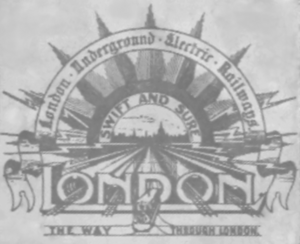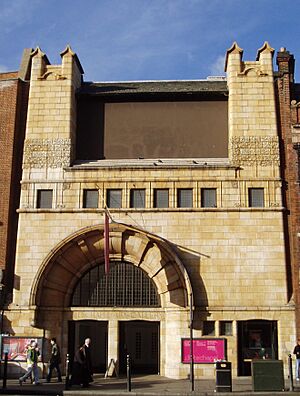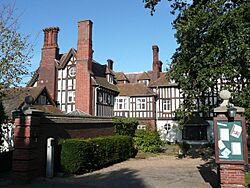Edgar Speyer facts for kids
Quick facts for kids
Sir Edgar Speyer
|
|
|---|---|
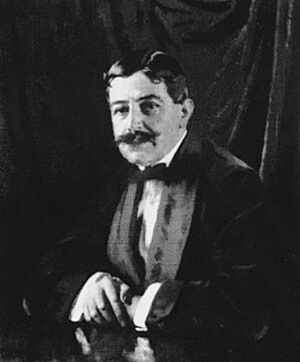
Sir Edgar Speyer by Sir William Orpen, 1914
|
|
| Born | 7 September 1862 New York City, New York, United States
|
| Died | 16 February 1932 (aged 69) Berlin, Germany
|
| Nationality | American, British (revoked) |
| Occupation | Banker and philanthropist |
| Spouse(s) | |
| Children | 3 |
| Chairman of Underground Electric Railways Company of London | |
| In office 3 January 1906 – 18 May 1915 |
|
| Preceded by | Charles Yerkes |
| Succeeded by | Lord George Hamilton |
Sir Edgar Speyer (born September 7, 1862 – died February 16, 1932) was a very successful banker and a generous person. He was born in America but later became a British citizen in 1892. He led the British part of his family's international banking business, Speyer Brothers.
He was also the chairman of the Underground Electric Railways Company of London (UERL) from 1906 to 1915. This company was a big part of creating the London Underground, which is London's subway system. During his time, three new underground lines opened, one was made electric, and two more were taken over.
Edgar Speyer loved music and supported many famous composers like Edward Elgar and Richard Strauss. He helped fund the popular Promenade Concerts for many years. He also gave money to other good causes, like Captain Scott's trip to Antarctica. Because of his kindness, he received special honors from the British government.
However, when World War I started, people began to attack him because of his German background. In 1915, he offered to give up his honors and left for the United States. Later, in 1921, the British government took away his British citizenship. They said he had acted in ways that were not loyal during the war. Speyer denied these claims.
Contents
Edgar Speyer's Early Life and Work
His Family and Background
Edgar Speyer was born in New York City on September 7, 1862. His parents, Gustav and Sophia Speyer, were German Jewish bankers from Frankfurt. Edgar went to school in Frankfurt.
In 1902, he married Leonora von Stosch, an American violinist, in Hamburg. They met at a concert where Leonora played. They had three daughters named Pamela, Leonora, and Vivien.
A Successful Banker
In 1884, Edgar joined his father's banking businesses. He first managed the office in Frankfurt. Then, in 1887, he took charge of the London office, Speyer Brothers. His older brother, James, ran the New York company. Their banks specialized in moving money between Europe and the United States. They also helped fund railway projects. In 1892, Edgar Speyer became a British citizen.
Speyer's work in railway finance connected him with Charles Yerkes in 1900. Yerkes was an American who had developed Chicago's transport system. He came to London to build new deep underground railways, known as "tube" lines. Speyer and Yerkes led a group of international investors. They helped build three of London's underground railways and made a fourth one electric.
The Underground Electric Railways Company of London (UERL) was started in 1902. It had a lot of money, with most shares sold to investors from other countries. Yerkes died in 1905, and Speyer became the chairman of the UERL. By 1907, the new railways were open, and the electric works were done.
However, the company faced money problems. They had expected more passengers, and their income was not covering their costs. Speyer, along with Albert Stanley, worked hard to fix the company's finances. They succeeded by buying the London General Omnibus Company in 1912. The bus company's profits helped cover the railway's losses. Speyer also bought two other main tube railways in London in 1912.
A Generous Supporter of Arts and Charity
As the head of the London banking business, Speyer became very rich. He owned two houses in London that he combined into one large home. He also built a big country house called "Sea Marge" in Norfolk. He filled his homes with art and furniture from all over Europe. He also had his portrait painted by William Orpen.
Edgar Speyer loved music and often held concerts at his home. He was friends with famous composers like Edward Elgar and Richard Strauss. He owned valuable violins, which his wife played. From 1902 to 1914, Speyer was the chairman of the Queen's Hall Concert board. He paid a lot of money each year to support the Promenade Concerts. He helped improve the orchestra and brought famous musicians to London. Strauss even dedicated his opera Salome to Speyer.
Speyer also gave money to help start the Whitechapel Art Gallery. He was a trustee there for 15 years. He supported hospitals and gave a large donation to the King Edward's Hospital Fund. In 1904, he replaced all the money lost by people in a small savings bank in Suffolk.
From 1909, Speyer helped manage the money for Robert Falcon Scott's 1910 British Antarctic Expedition. He donated £1,000 himself. Mount Speyer in Antarctica is named after him. One of Scott's last letters was written to Speyer.
For his good deeds, Speyer was given the title of baronet in 1906. He was also made a Privy Counsellor in 1909. In 1911, he received an award from the German Emperor.
Life After 1914
Facing Unfair Criticism
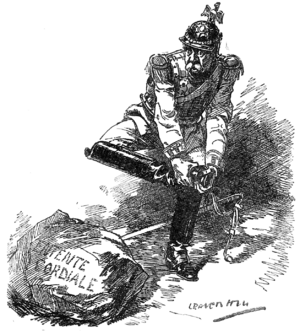
Before World War I, feelings against Germans grew in Britain. People became suspicious of Germans and those with German backgrounds. When Britain declared war on Germany in August 1914, Speyer resigned from his German and American banking roles.
Despite this, a hate campaign started against him because of his German parents. Crowds gathered outside his home and shouted at visitors. Newspapers accused him of being disloyal. People even claimed he was signaling to German submarines from his house. Lady Speyer was excluded from social groups. Speyer was asked to leave the board of a hospital. Other parents threatened to remove their children from school if his daughters stayed.
Speyer refused to write a "loyalty letter" that some suggested. Instead, in May 1915, he wrote to the Prime Minister, asking to give up his honors. He said he could no longer stay silent about the unfair accusations. He also resigned from his public positions, including chairman of the UERL.
The Prime Minister supported Speyer, saying the accusations were "baseless and malignant." He refused to take away Speyer's honors. However, Speyer and his family left for America in May 1915.
Citizenship Taken Away
In 1918, the British government looked into Speyer's membership in the Privy Council again. Speyer offered to resign, but got no reply.
After an investigation, Speyer's British citizenship was taken away on December 1, 1921. On December 13, King George V ordered that Speyer be removed from the list of the Privy Council. The committee investigating him said Speyer had shown disloyalty and had communicated with people in enemy countries. They also said he had been involved with a business that helped the enemy. Lady Speyer and their children also lost their British nationality.
The committee's report was made public in January 1922. It listed nine reasons for their decision. These included:
- Being slow to resign from his American bank, which still had German partners.
- His London bank continuing to trade with a Dutch firm that traded with Germany.
- Communicating with his German brother-in-law during the war.
- Trying to avoid the censor when writing letters.
- His friendship with a German conductor in America who was pro-German.
- Lending money to a newspaper that printed pro-German articles.
- Authorizing payments to friends through his Frankfurt bank, which was not allowed by wartime rules.
Speyer's banking partners published a letter supporting him. Speyer himself also released a statement. He said the accusations were minor and that the whole thing was "political persecution." He challenged the government to show proof that would make any fair person agree with the report's conclusions.
Later Years and Legacy
In 1920, Speyer Brothers sold its shares in the UERL. Speyer also tried to sell his London home. In 1922, Speyer Brothers in London was closed. His London house was sold in 1923 and became the American Women's club.
Speyer rejoined the family bank branches in America and Germany. He continued to live in New York. He died on February 16, 1932, in Berlin, after an operation. He was buried in Berlin. He kept his baronetcy until his death, but it ended because he had no sons.
Speyer left behind two main legacies: the London Underground tube lines and the Promenade Concerts. The tube lines might not have been built without his help in raising money. The Promenade Concerts might have stopped without his financial support. These tube lines are now part of the Northern, Piccadilly, and Bakerloo lines of the London Underground.
After Speyer stopped funding the Promenade Concerts, the BBC took them over. Speyer's London home later became the Japanese Embassy and is now an office building. His country house, Sea Marge, became a hotel. His wife, Leonora, became a poet and won a Pulitzer Prize.


